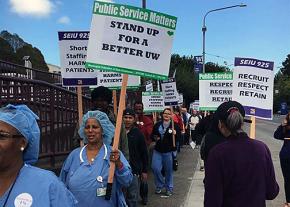Solidarity gets the goods at UW
reports on a contract campaign at the University of Washington that was marked by improved coordination between the two main unions on campus.
AFTER SEVERAL months of a hard-fought campaign, workers at the University of Washington in Seattle have won a two-year contract with significant gains.
The contract calls for a 6 percent raise over two years, increased vacation time for long term workers, enforceable anti-bullying language, equalization of pay between job classes and additional increases for several categories of workers paid below market rates. The contract doesn't contain many of the university's initial concessionary demands--including one that would have allowed short-term layoffs.
One of the key factors in this victory was solidarity between two of the main campus unions: Service Employees International Union (SEIU) Local 925, which represents technical and office workers, and Local 1488 of the Washington Federation of State Employees (WFSE), which represents janitors, groundskeepers, food service workers and building trades workers.
In years past, these two unions sat at separate tables and coordinated their proposals outside the bargaining room. This year for the first time, they not only bargained together, but organized several joint actions—including "unity picnics" and an informational picketing involving over 1,000 workers at five different sites on the UW campus on September 20.

Other actions included a September 21 march on the contract negotiation site by dozens of workers and a sit-in by 70 workers the following day, which partially blocked the elevators at the UW Tower, one of the school's main administrative buildings.
At the march, the university's chief negotiator Mindy Kornberg urged patience to the assembled workers. They were having none of it, shouting her down until she was forced to retreat.
PART OF the workers' frustration was the October 1 deadline to settle the contract and get it funded by the state legislature—letting the administration drag out the talks would have been a disaster.
Workers were also outraged by the administration's initial proposal: a 1 percent raise over two years. They got even angrier when the university announced its standard annual raise to administrators and professors.
Classified staff at UW, represented by Locals 925 and 1488, has seen real wages drop in the face of rapidly rising rents and transportation costs in the Seattle area.
Last year alone, average rents in Seattle rose 7 percent. Thirty miles south in Tacoma, where many workers have moved in search of lower rents, the average rent has risen 13 percent in just the past six months!
Beginning in 2008, the UW used the excuse of the Great Recession to deny workers across-the-board raises for the next five years, putting them way behind the skyrocketing cost of living.
Last year, after hard bargaining, the UW finally agreed to raise all its workers to $13 per hour by January 2016 and $15 by January 2017, although workers at the Tacoma campus were excluded.
This grudging acceptance came from an administration that pays 1,700 of the university's highest-paid managers and professors over $150,000 per year--and many top administrators over $300,000. The concentration of wealth is alive and well at UW.
In addition to winning wage increases in the new contract, the two unions fought for language against bullying by management and upgrades for individual job classifications. The administration had at first accepted only unenforceable anti-bullying language, but conceded in the end.
Many issues remain unresolved. UW workers in most if not all categories are still paid below market rates, and many jobs need reclassifications to provide up-to-date job descriptions and corresponding pay increases.
In spite of these problems, this is the best contract UW workers have won in many years. It came as a result of more militant action than in previous contract fights and the two main unions on campus working together both at the bargaining table and in protest.
Solidarity---the only way to win!


